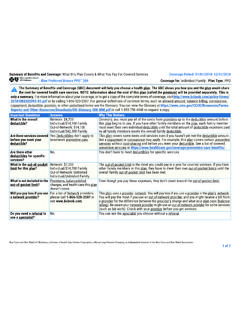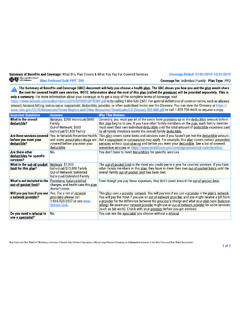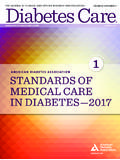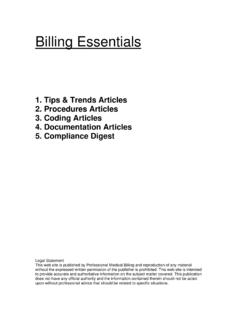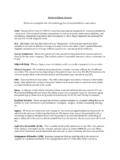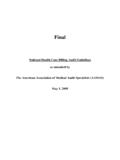Transcription of Billing/Documentation Guidelines for Urine Drug Tests
1 Billing/Documentation Guidelines for Urine drug Tests For 2015, the american medical association (AMA) created 63 new codes describing a series of Tests for the presence of various drugs. The codes include both presumptive Tests and definitive Tests for qualitative drug screens and quantitative drug level determination. In its preliminary decision, Centers for Medicare & Medicaid Services (CMS) reiterated its long-standing concerns about the potential for fraudulent and abusive billing of these drugs Tests , and decided to delay decision-making on pricing for the new codes.
2 CMS is concerned that the structure of the new drug testing codes may not prevent abusive billing . CMS states that it will continue to evaluate coding and pricing for these Tests . Likewise, Blue Cross and Blue Shield of Oklahoma (BCBSOK) will not price the newly created 2015 presumptive and definitive drug testing CPT codes. Generally, BCBSOK s billing Guidelines for Urine drug testing will be consistent with those established by CMS for safety, accuracy and quality of diagnostic testing and will make use of the HCPCS G codes (G6030 G6058) that CMS established to replace the deleted 2014 CPT drug test codes.
3 CLIA Certification Facilities and private providers who perform laboratory testing on human specimens for health assessment or the diagnosis, prevention, or treatment of disease are regulated under the Clinical Laboratory Improvement Amendments of 1988 (CLIA). Therefore, any provider who performs laboratory testing, including Urine drug Tests , must possess a valid a CLIA certificate for the type of testing performed. Qualitative drug Screen BCBSOK will continue to accept Qualitative drug screening codes, G0431 (high-complexity as identified by the Food and drug Administration (FDA) database) and G0434 (moderate-complexity as identified by the FDA database).
4 BCBSOK will use the FDA medical device database to determine complexity when reviewing drug screening/testing equipment or methodology. The database may be found on the FDA website located at . Test systems without specific FDA approvals are generally considered experimental, investigational and unproven. Please see BCBSOK medical policies for more information on non-FDA approved items. A Division of Health Care Service Corporation, a Mutual Legal Reserve Company, an Independent Licensee of the Blue Cross and Blue Shield association .
5 1 Physician office laboratories utilizing equipment or methodologies other than Gas chromatography Mass spectrometry (GC/MS) or Liquid chromatography Mass spectrometry (LC/MS) or similar complex diagnostics would bill Qualitative drug screening using G0434. Laboratories, including certain physician office laboratories, using GC/MS, LC/MS or other chromatographic/mass spectrometry diagnostic equipment would bill Qualitative drug screening using G0431. Qualitative drug screening is subject to meeting medical policy criteria including appropriate medical record documentation .
6 Confirmation drug Test Consistent with HCSC medical Policy , G6058 ( drug confirmation, each procedure) is indicated when the result of the drug screen is different than that suggested by the patient s medical history, clinical presentation or patient s own Each procedure in the context of confirmatory testing (G6058) means each time GC/MS or LC/MS is run. It does not mean confirmation testing of each individual drug . G6058 should be billed as 1 unit of service. Quantitative drug Test Quantitative individual drug Tests , HCPCS G6030 G6057, will require BCBSOK review of the ordering physician s medical records.
7 documentation Requirements The clinician s documentation must be patient specific and accurately reflect the need for each test ordered. Each drug or drug class being tested for must be indicated by the ordering clinician in a written order and documented in the patient s medical record. As stated more fully in HCSC medical Policy : Drugs or drug classes for which screening is performed should only reflect those likely to be present, based on the patient s medical history or current clinical presentation and without duplication.
8 Each drug or drug class being tested for must be indicated, by the referring clinician, in a written order and so reflected in the patient s medical record. Additionally, the clinician s documentation must be patient specific and accurately reflect the need for each test. Orders Orders for diagnostic Tests , including laboratory Tests , must be specific to both the patient and the need for the test requested. Panel testing is restricted to panels published in the current CPT manual. Orders must be signed and dated by the ordering health care professional.
9 Custom panels are not specific to a particular patient and are not allowed. Routine screenings, including quantitative panels, performed as part of a clinician s protocol 1 HCSC medical Policy states: Confirmatory testing is not appropriate for every specimen and should not be done routinely. This type of test should be performed in a setting of unexpected results and not on all specimens. The rationale for each confirmatory test must be supported by the ordering clinician s documentation . The record must show that an inconsistent positive finding was noted on the qualitative test testing or that there was not an available qualitative test to evaluate the presence of semi-synthetic or synthetic opioid in a patient.
10 2 for treatment, Standing orders which may result in testing that is not individualized and/or not is used in the management of the patient s specific medical condition and Validity testing, an internal process to affirm that the reported results are accurate and valid, are not reimbursable. Claims for which the medical records do not meet documentation requirements will not be reimbursed. Reimbursement is subject to: medical record documentation , including appropriately documented Orders Correct CPT/HCPCS coding Member Benefit and Eligibility Applicable BCBS medical Policy(ies) 3


